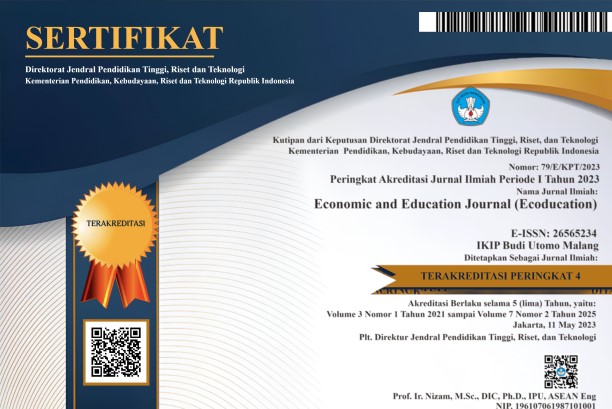Entrepreneurial Skills Dalam Mata Kuliah Small Business Project
Entrepreneurial Skills in Small Business Project Courses
Abstract
Keterampilan wirausaha (entrepreneurial skills) diduga dapat ditingkatkan secara signifikan dengan cara menyediakan lingkungan belajar di mana siswa berinteraksi dalam dunia binsis nyata melalui kegiatan proyek langsung yang bukan hanya bersifat simulasi. Penelitian ini bertujuan untuk menganalisis serta mengadakan pengukuran keterampilan kewirausahaan dalam pembelajaran berbasis pengalaman lapangan. Pengumpulan data dilakukan dengan menyebarkan kuesioner kepada seluruh mahasiswa Program Studi Administrasi Bisnis, baik program Diploma Tiga maupun program Diploma Empat. Dari penyebaran kuesioner tersebut, dapat diperoleh sebanyak 222 kuesioner terisi. Data yang diperoleh kemudian dianalisis dengan menggunakan Uji beda independent T-test. Hasil penelitian menunjukan bahwa besarnya rata-rata (mean) pada kelompok mahasiswa yang sudah mendapatkan mata kuliah Small Business Project (SBP) mempunyai tingkat entrepreneurial skills lebih baik dibandingkan dengan kelompok mahasiswa yang belum mendapatkan mata kuliah SBP. Hasil penelitian ini mempunyai P-value = 0,000, sedangkan tingkat kepercayaan yang dipakai 95 % (cut-off yang dipakai = 0,05). Oleh karena P-value dari hasil penelitian ini lebih kecil dari cut-off yang dipakai (0,000<0,05), maka berarti ada perbedaan tingkat entrepreneurial skills yang signifikan antara kelompok mahasiswa yang sudah mendapatkan mata kuliah SBP dengan kelompok mahasiswa yang belum mendapatkan mata kuliah SBP, dimana kelompok mahasiswa yang sudah mendapatkan mata kuliah Small Business Project (SBP) mempunyai tingkat entrepreneurial skills lebih baik dibandingkan dengan kelompok mahasiswa yang belum mendapatkan mata kuliah SBP. Penelitian ini memberikan temuan bahwa metode pembelajaran berbasis praktik lebih berhasil daripada yang hanya berfokus lecturing.
References
Almeida, C. S. de, Miccoli, L. S., Andhini, N. F., Aranha, S., Oliveira, L. C. de, Artigo, C. E., Em, A. A. R., Em, A. A. R., Bachman, L., Chick, K., Curtis, D., Peirce, B. N., Askey, D., Rubin, J., Egnatoff, D. W. J., Uhl Chamot, A., El‐Dinary, P. B., Scott, J.; Marshall, G., Prensky, M., … Santa, U. F. De. (2016). Title. In Revista Brasileira de Linguística Aplicada (Vol. 5, Issue 1).
Badan Pusat Statistik Indonesia. (2020). Catalog : 1101001. Statistik Indonesia 2020, 1101001, 790. https://www.bps.go.id/publication/2020/04/29/e9011b3155d45d70823c141f/statistik-indonesia-2020.html
Colombo, M. G., & Piva, E. (2020). Start-ups launched by recent STEM university graduates: The impact of university education on entrepreneurial entry. Research Policy, 49(6), 103993. https://doi.org/10.1016/j.respol.2020.103993
Esfandiar, K., Sharifi-Tehrani, M., Pratt, S., & Altinay, L. (2019). Understanding entrepreneurial intentions: A developed integrated structural model approach. Journal of Business Research, 94(August 2016), 172–182. https://doi.org/10.1016/j.jbusres.2017.10.045
Farooq, M. S. (2018). Modelling the significance of social support and entrepreneurial skills for determining entrepreneurial behaviour of individuals. World Journal of Entrepreneurship, Management and Sustainable Development, 14(3), 242–266. https://doi.org/10.1108/wjemsd-12-2017-0096
Issa, E. H., & Tesfaye, Z. Z. (2020). Entrepreneurial intent among prospective graduates of higher education institution: an exploratory investigation in Kafa, Sheka, and Bench-Maji Zones, SNNPR, Ethiopia. Journal of Innovation and Entrepreneurship, 9(1), 1–19. https://doi.org/10.1186/s13731-020-00137-1
Kolb, D. A. (1984). Experiential Learning: Experience as The Source of Learning and Development. Prentice Hall, Inc., 1984, 20–38. https://doi.org/10.1016/B978-0-7506-7223-8.50017-4
Kuswara, H. (2012). Strategi Perguruan Tinggi Mewujudkan Entrepreneurial Campus. Ristekdikti, 4(2), 255–262. https://www.ristekdikti.go.id/strategi-perguruan-tinggi-mewujudkan-entrepreneurial-campus/
Küttim, M., Kallaste, M., Venesaar, U., & Kiis, A. (2014). Entrepreneurship education at university level and students ’ entrepreneurial intentions. Procedia - Social and Behavioral Sciences, 110, 658–668. https://doi.org/10.1016/j.sbspro.2013.12.910
Malhotra, N. K., & Birks, D. F. (2006). An Applied Approach Updated. www.pearson.com/uk
Mei, H., Lee, C. H., & Xiang, Y. (2020). Entrepreneurship education and students’ entrepreneurial intention in higher education. Education Sciences, 10(9), 1–18. https://doi.org/10.3390/educsci10090257
Meoli, A., Fini, R., Sobrero, M., & Wiklund, J. (2020). How entrepreneurial intentions influence entrepreneurial career choices: The moderating influence of social context. Journal of Business Venturing, 35(3). https://doi.org/10.1016/j.jbusvent.2019.105982
Mirna Noventri, I., Perawitan Pakpahan, J., Wardani Pane, J., & Hutabarat, L. (2022). Peran Kewirausahaan Berbasis Digital Dalam Mengurangi Tingkat Pengangguran. Journal of Millennial Community, 3(2), 68. https://doi.org/10.24114/jmic.v3i2.32339
Nabi, G., LiÑÁN, F., Fayolle, A., Krueger, N., & Walmsley, A. (2017). The Impact of Entrepreneurship Education in Higher Education: A Systematic Review and Research Agenda. Academy of Management Learning & Education, 16(2), 277–299. http://www.jstor.org/stable/26400192
Ratten, V., & Usmanij, P. (2021). Entrepreneurship education: Time for a change in research direction? International Journal of Management Education, 19(1), 100367. https://doi.org/10.1016/j.ijme.2020.100367
Richardson, I., & Hynes, B. (2008). Entrepreneurship education: Towards an industry sector approach. Education + Training, 50(3), 188–198. https://doi.org/10.1108/00400910810873973
The Quality Assurance Agency for Higher Education. (2014). UK Quality Code for Higher Education: Part A: Setting and Maintaining Academic Standards. October, 1–50. http://www.qaa.ac.uk/en/Publications/Documents/quality-code-brief-guide.pdf
Tung, D. T., Hung, N. T., Phuong, N. T. C., Loan, N. T. T., & Chong, S. C. (2020). Enterprise development from students: The case of universities in Vietnam and the Philippines. International Journal of Management Education, 18(1), 100333. https://doi.org/10.1016/j.ijme.2019.100333
Wishnu, L., Shandy, B., Wibowo, A., Martha, A., Aris, N., Harwida, G., & Nur, A. (2020). Heliyon The impact of entrepreneurship education and students ’ entrepreneurial mindset : the mediating role of attitude and self-ef fi cacy. Heliyon, 6(September), e04922. https://doi.org/10.1016/j.heliyon.2020.e04922
Yaghoubi Farani, A., Karimi, S., & Motaghed, M. (2017). The role of entrepreneurial knowledge as a competence in shaping Iranian students’ career intentions to start a new digital business. European Journal of Training and Development, 41(1), 83–100. https://doi.org/10.1108/EJTD-07-2016-0054















